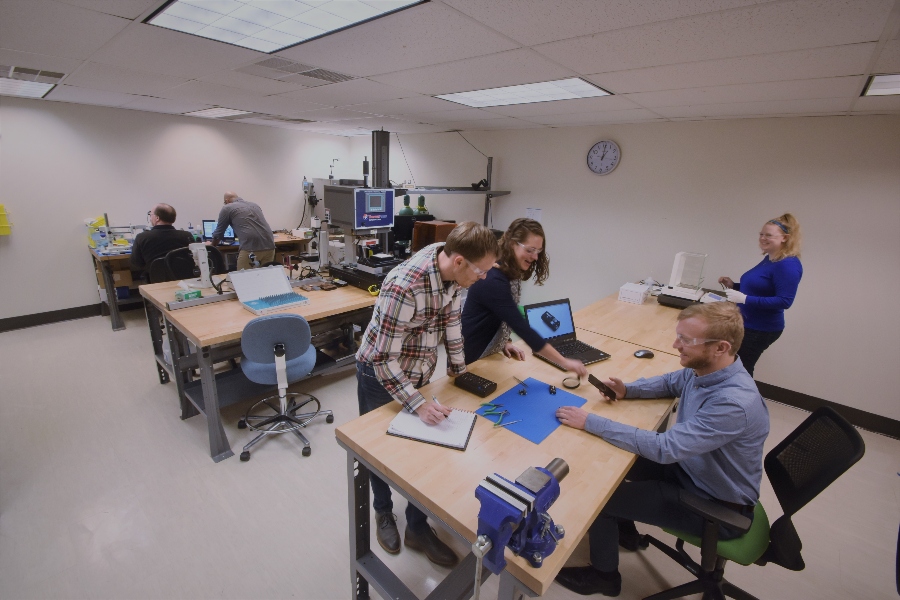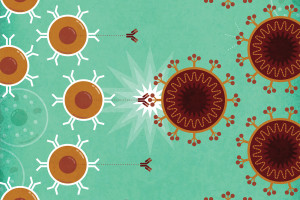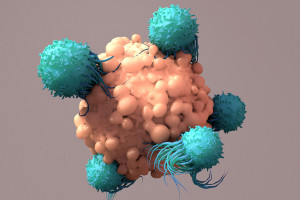NextUp: The KOP-Based Engineering Biz Helping Create Next-Gen Medical Devices
Here’s how Neuma works to ensure pharmaceutical and medtech companies are set up for success as they bring their products to market.

The Neuma team working in the lab. Photograph courtesy Neuma
“NextUp” is a weekly NextHealth PHL feature that highlights the local leaders, organizations and research shaping the Greater Philadelphia region’s life sciences ecosystem. Email ccunningham@phillymag.com with pitches for NextUp.
Who: Engineers Nick Ciccarelli, Alexis Dechelette, and Shaun Devitt met while working for medical device company, Unilife Corporation. When Unilife filed for bankruptcy in spring 2017, the trio decided to harness their specialized skills and professional drive to continue turning novel technologies into marketable products. They officially launched their own company, Neuma, that July.
What: Based in King of Prussia, Neuma is a medical device engineering company focused on electromechanical and drug delivery services. With design for production (DFP) services, Neuma helps pharmaceutical and medical technology companies improve their designs’ testability, manufacturability, assembly, and sterilization capacity in order to both accelerate the transition to commercialization and reduce cost, turnaround time, and risk.
Ciccarelli says Neuma’s DFP, which is based on basic engineering principles and FDA regulations, helps clients understand where they are in the development process, as well as where they should logically go next. Some clients, he says, need to develop a prototype to put in front of people to test initial usage, while others already have an initial prototype and are looking to obtain the infrastructure needed for manufacturing. No matter what the project entails, Ciccarelli says Neuma’s main question to clients is, “What is the most impactful, necessary next milestone we can help you achieve?” That way, there is a clear objective and goal around which to create a reasonable, yet efficient timeline.
When: Though Neuma has been in operation for nearly four years, the company has recently taken strides to focus even more on Philly’s biotech scene. Within the past 18 months, Neuma became a member of Life Sciences PA and was included in the Philadelphia Regional Integrated Medicine Alliance (PRIMA) of Ben Franklin Technology Partners of Southeastern Pennsylvania — both of which allow Neuma to further help local start-ups navigate their product development stages. Additionally, Ciccarelli just became an industry mentor on behalf of Neuma for the National Science Foundation’s I-Corps program. In this role, he will provide support for budding entrepreneurs across the country. Looking ahead, Ciccarelli says Neuma has also been in a number of conversations with Penn in terms of getting involved in their incubator program so that forthcoming start-ups can get direct help with product development.
What it means: Ciccarelli says the development process is intricate and takes time and energy, not just in terms of product design, but with risk analysis regarding engineering, manufacturing, and commercializing. Whether they’re working with a large, global pharma company or a small local start-up, Neuma has to remain methodical and attentive to detail in order to prepare devices for regulatory FDA submission and low-cost manufacturing. “Neuma’s supportive, deliberate structure and internal fortitude ensure that every product is both safe and marketable before hitting shelves,” he says. “We keep projects moving forward at a pace that will get them into the marketplace so they can better people’s lives, but not at a rate that will compromise product safety, cost, or longevity.”
Why it matters now: COVID-19 aside, Ciccarelli recognizes that so many people, especially those who live with chronic illness, are in need of medical solutions. “I feel a personal responsibility as a medical device engineer to help facilitate cutting-edge technology, to help solve current health-related problems,” he says. “Neuma continues to keep rolling out medical solutions so that people can live healthier lives now and in the future. We can’t let promising technology go to waste, and we definitely can’t let down people who need that technology most.”


